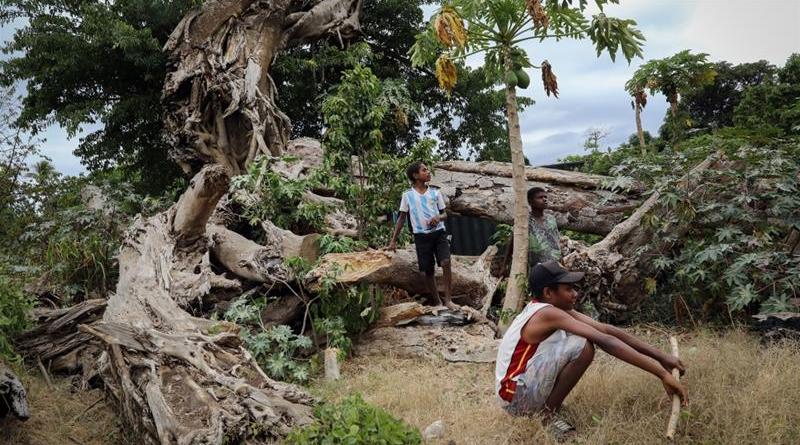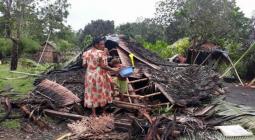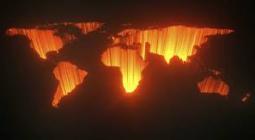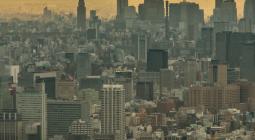A moment of reckoning - when coronavirus meets climate change.

Cyclones in the Pacific and pandemics tell us a lot about global inequality and highlight our futile pursuit of profit.
In the midst of economic shocks and border closures caused by the coronavirus pandemic, the Pacific region has yet again been ravaged by a Category 5 cyclone that left a trail of destruction across four Pacific island countries in a span of four days from April 5 to 8.
The economic toll from Cyclone Harold and the response to the coronavirus pandemic to Pacific economies is yet to be determined, but they have for sure rolled backed significant economic gains in these countries.
The economic, social and environmental impacts of the pandemic, exacerbated by climate-induced disasters such as tropical Cyclone Harold, will reverberate well into the future for these countries.
COVID-19 and climate change have re-emphasised the fragility of Pacific economies and their acute vulnerability to global phenomena.
Oxfam's report on the potential economic impact of the coronavirus - Dignity not Destitution - demonstrates that the scenario unfolding in the Pacific is a reality that most vulnerable and poor developing countries in the Global South could relate to in light of the current global precarity and uncertainty.
The Pacific double whammy brings us to an important moment for the world to reexamine our current approach to development, specifically the dominant economic model that prioritises profit over people and the environment.
Both COVID-19 and climate change continue to expose the failures in our economic structures and the need to change our approach to how our economies are governed.
Inequality - the common denominator
Inequality is perhaps the most obvious flaw of the current economic model. Both cyclones and pandemics exacerbate the persistent inequalities at different levels of our societies.
Those who are bound to suffer the most from the extreme effects of these two phenomena are the poorest and the "have nots" in societies.
In a global economy where the world's richest one percent of people have more than twice as much wealth as 4.6 billion of the poorest people on earth, according to a report by Oxfam in 2020, the ability of the majority of the population right now to access the resources they need to holistically build their resilience and bounce back from global crisis is severely limited and in some cases non-existent.
Oxfam's briefing, Dignity not Destitution, forecasts that half a billion more people are now likely to be pushed into poverty because of the pandemic without an urgent and a human-oriented emergency global rescue package that is compassionate towards the needs of world's poorest and vulnerable countries.
What we need is a global rescue package that not only focuses on protecting small businesses but one that also provides safety nets to the most vulnerable populations.
Importantly, the pandemic and climate change have once again shone a harsh light on the persistent social gendered inequalities in our communities.
The plight of women and girls in all their diversity during times of crisis has again been laid bare. While different groups are affected differently during times of crisis, the economic burdens and hardships are disproportionately borne by women.
As the global economy is currently at a standstill, women are increasingly taking on more domestic and family workloads, exposing them to greater health and social risks.
This gendered inequality extends well beyond the informal care economy, now, into the formal labour market. The core labourers of the essential services that are now holding the very fabric of our society together are made up primarily of women.
Women account for the majority at the front line of the retail, agriculture and healthcare sectors - essential sectors that for so long have been underappreciated and overburdened.
Ironically, the very people we have so far neglected to invest in and empower are the very ones who are now working overtime, under stressful circumstances and poor labour conditions. They are the ones that we are now pinning our hopes on to carry us through these precarious times.
Building a different economy
The ongoing climate crisis and the arrival of the coronavirus pandemic remind us about the folly of turning our backs on the values that we hold dear in our societies. This crisis has brought to the fore the fact that what we turn to for safety, comfort and solace in hard times are our relationships, our kinship and our human connections and compassion.
The demand that we look after each other will always be our fall-back position. It is critical that these values are given more prominence in the new ways of governing our affairs as we try to both contain the impact of the crisis and, at the same time, map a pathway for economic recovery.
Governments need to heed the painful lessons of both the impacts of climate change and the pandemic. They need to act urgently towards transitioning our economic model towards one that is caring, humane and just, rather than just fuelling the endless pursuit of profit.
More importantly, it is also critical that we channel our investment priorities towards building and strengthening functioning social protection systems so that we are able to respond effectively to global crises like pandemics, or more localised disasters like Cyclone Harold.
Governments must reverse the past trend of shirking their responsibilities for providing essential services to their citizens, specifically in the provision of social protections, health, housing, water and other utilities, and instead selling them out to private corporations, which are driven solely by wealth creation, or relying on struggling charities.
In re-prioritising national economic strategies during the post-crisis situation, consideration of gender and class-based inequalities, as well as human rights, must become integral components to ensure that the economy will work for all of us, instead of a privileged few.
We are now approaching a crossroads; we can either continue with the business-as-usual way of development, or we can change: We transform the way we do things and build an economy that nurtures our people and our planet.
This is the political choice that is at stake. For our sake, and the sake of our children, we urge our leaders to choose the latter, because sticking with the status quo will only bring about more suffering and destruction to our world.
The views expressed in this article are the author's own and do not necessarily reflect Al Jazeera's editorial stance.
17 May 2020
Al Jazeera





